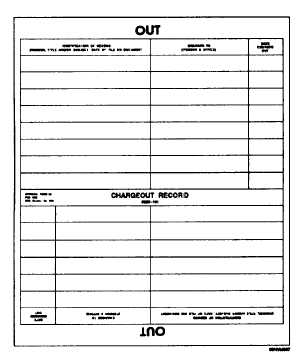| |
Figure 5-4.-Chargeout Record, Optional Form 23.
You should make periodic checks of the
chargeout records you have in your files to
make sure no documents have been out for an
unreasonable period of time. This check may
help avoid loss or misplacement if the
borrower should forget to return the document
after it is no longer needed.
ESTABLISHMENT OF FILES
Each year every command closes out the
files of the previous year, so a new set should
be set up. There is nothing difficult about
this task, but some thought should be given to
the process.
The importance of having files is already
well established. The accuracy of the filing
system and the ease in retrieving information
are just as important. The administration of a
command is an ongoing process that requires
easy access to previous correspondence either
received or sent out.
Without efficiently
managed files time is lost and the command’s
overall effectiveness can be affected.
When starting up a new year’s files, always
take a look at last year’s files. Where was the
most information contained? Which SSIC files
were really bulky, and which contained only
a few pieces of paper? Use this review to
prepare your new folders. Some SSIC groups
could be broken down further to make them
quicker to find.
Some groups could be
combined in the same folder to save space, If
you are setting up the files for a brand new
command, keep in mind the basic mission of
your command.
If your command has a
basically logistic mission, those subject groups
will probably be used the most. Likewise, it
could be ordnance related, operations related,
or personnel related, so those groups will see
more use.
MESSAGE FILES
Messages are filed numerically in the order
of the date time group (DTG). The DTG is
expressed as six digits with a zone suffix plus
an abbreviated month and a two-digit year.
The first pair of digits denotes the date of the
month, the second pair denotes the hours, and
the third pair the minutes, followed by a
capitalized letter that indicates the zone. For
standardization, all naval communications use
Greenwich (Z) time. The month and year are
abbreviated by using the first three letters of
the month and the last two digits of the year;
for example, 172140Z MAY 94.
Separate message files are maintained for
incoming and outgoing messages, with the
most recent message on top. Separate files
are also maintained for general messages such
as ALNAV (All Navy) and NAVOPS (Navy
Operations).
They are normally filed in
numerical order by calendar. Other forms of
messages
that are filed separately are
CASREPs (Operational reports), PERSONAL
5-5
|

